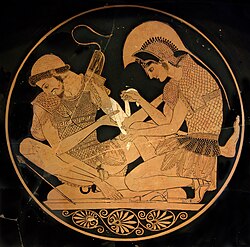Our website is made possible by displaying online advertisements to our visitors.
Please consider supporting us by disabling your ad blocker.
Trojan Horse
| Trojan War |
|---|
 |
In Greek mythology, the Trojan Horse (Greek: δούρειος ίππος, romanized: doureios hippos, lit. 'wooden horse') was a wooden horse said to have been used by the Greeks during the Trojan War to enter the city of Troy and win the war. The Trojan Horse is not mentioned in Homer's Iliad, with the poem ending before the war is concluded, and it is only briefly mentioned in the Odyssey. But in the Aeneid by Virgil, after a fruitless 10-year siege, the Greeks constructed a huge wooden horse at the behest of Odysseus, and hid a select force of men inside, including Odysseus himself. The Greeks pretended to sail away, and the Trojans pulled the horse into their city as a victory trophy. That night, the Greek force crept out of the horse and opened the gates for the rest of the Greek army, which had sailed back under the cover of darkness. The Greeks entered and destroyed the city, ending the war.
Metaphorically, a "Trojan horse" has come to mean any trick or stratagem that causes a target to invite a foe into a securely protected bastion or place. A malicious computer program that tricks users into willingly running it is also called a "Trojan horse" or simply a "Trojan".
The main ancient source for the story still extant is the Aeneid of Virgil, a Latin epic poem from the time of Augustus. The story featured heavily in the Little Iliad and the Sack of Troy, both part of the Epic Cycle, but these have only survived in fragments and epitomes. As Odysseus was the chief architect of the Trojan Horse, it is also referred to in Homer's Odyssey.[1] In the Greek tradition, the horse is called the "wooden horse" (δουράτεος ἵππος douráteos híppos in Homeric/Ionic Greek (Odyssey 8.512); δούρειος ἵππος, doúreios híppos in Attic Greek). In Dictys Cretensis' account, the idea of the Trojan Horse's construction comes from Helenus, who prophesies that the Greeks must dedicate a wooden horse to Athena.[2]
Previous Page Next Page


